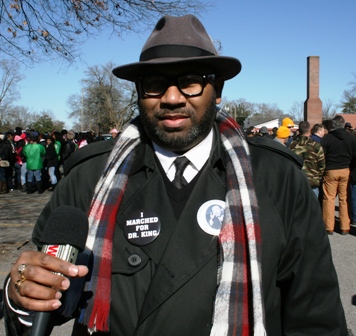There was a record turnout for the ninth annual Murfreesboro Martin Luther King, Jr. march on Monday. The event began at Central Magnet School as hundreds made the trek to the Patterson Community Center.
Parade Organizer Shawn Brown spoke with WGNS' Bart Walker . . .
Despited the temperature being in the upper 30's, sunshine made the day much more pleasant--and the hot chocolate also made Murfreesboro's MLK March a popular attraction on Monday, January 21st.
There appeared to also be more of an organized effort among church and civic groups to increase their representation in the annual event.
Unofficially, some estimates place the attendance over 400 persons.
People Brought Memories To Share With Yough
 Keeping Dr. King's "Dream Alive" among younger persons who were not even dreamed of until decades after the Civil Right's leader's assasination on the night of April 4, 1968 at the Lorraine Motel in Memphis. That structure is now the site of the National Civil Rights Museum and a wreath marks the spot where Dr. King was shot.
Keeping Dr. King's "Dream Alive" among younger persons who were not even dreamed of until decades after the Civil Right's leader's assasination on the night of April 4, 1968 at the Lorraine Motel in Memphis. That structure is now the site of the National Civil Rights Museum and a wreath marks the spot where Dr. King was shot.
(Left photo) Murfreesboro resident Johnny Reed brings a photo of Dr. King that has meant much to him over the years.
Once the group made its way to the Patterson Community Center, they learned more about the accomplishments of the civil rights leader.
Dr. King's Timeline of Accomplishments
1955 He received a PhD in systematic theology from Boston University.
1955 At age 26 heorganized a boycott against the segregated public buses in Montgomery, Alabama.
1956 Dr. King's home was bombed which prompted the U.S. Supreme Court's legislation desegrating buses in Montgomery.
1957 Dr. King helped to found the Southern Christian Leadership Conference.
1959 He studied non-violence and civil disobedience programs in India.
1963 Arrested and jailed in Birmingham where he wrote the famous series "Letters From The Birmingham Jail".
1963 Led 200,000 marhers on Washington and made the famous "I Had A Dream" speech.
1964 Dr. King received the Nobel Prize, and U.S. Congress passed the Civil Rights Act of 1964. That made it illegal to practice segregation in public accomodations, along with discrimination in education and employment.

1965 His actions prompted congress to pass the Civil Rights Act of 1965 which banned literacy tests and other restrictions that would prevent Blacks from voting.
Mid-1960's Dr. King's actions against the Vietnam War angered President Johnson and further divided the population. Dr. King allegedly was having less influence on young Blacks, and the Black Power and self-protection movement started to explode.
1967 He started efforts to redistribute wealth and erradicate poverty among the Black population. Dr. King published a series called Where Do We Go From Here: Chaos or Community?.
1968 During a visit to Memphis to support striking sanitation workers, Dr. Martin Luther King, Jr. was assisnated at 6:00 o'clock on the evening of April 4, 1968.






